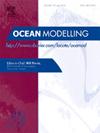基于enoi的全球海洋环流多尺度同化新模式
IF 2.9
3区 地球科学
Q2 METEOROLOGY & ATMOSPHERIC SCIENCES
引用次数: 0
摘要
随着观测技术和计算技术的进步,多尺度数据同化(MS-DA)已成为数据同化研究的一个重要热点。具有可变分辨率网格的全球海洋模型在特定区域具有优势,突出了为这些模型量身定制的MS-DA方法的必要性。本研究开发了一个扩展单尺度数据同化(SS-DA)框架的MS-DA系统。它集成了一个多网格插值模块,并使用MPI-OM海洋模型和集成卡尔曼滤波(EAKF)同化技术。该系统旨在提高计算效率和改善同化的温度和盐度资料,特别是在中国南海(SCS)。MS-DA系统采用两步同化过程将高分辨率模型数据转换为低分辨率网格,反之亦然,并通过并行计算加速数据处理。研究比较了MS-DA和SS-DA的计算性能和同化结果。结果表明,与SS-DA相比,MS-DA系统的计算时间缩短了20%,且全球海温(SST)和盐度(SSS)同化差异极小。然而,MS-DA系统在SCS中表现更好,将SST和SSS的平均绝对误差(MAE)分别降低了0.01°C和0.01 PSU。它还使南海500米以上的温度和盐度同化分别提高1.7%和6.2%。总的来说,MS-DA系统以更低的计算成本提供了更好的同化性能,特别是在像SCS这样的高分辨率区域。本文章由计算机程序翻译,如有差异,请以英文原文为准。
A new EnOI-based multiscale assimilation system for global ocean circulation model
With advancements in observational techniques and computational technologies, multi-scale data assimilation (MS-DA) has become a significant focus in data assimilation research. Global ocean models with variable resolution grids offer advantages in specific regions, highlighting the need for MS-DA methods tailored for these models. This study develops an MS-DA system that extends the single-scale data assimilation (SS-DA) framework. It integrates a multi-grid interpolation module and uses the MPI-OM ocean model with the Ensemble Kalman Filter (EAKF) assimilation technique. The system aims to enhance computational efficiency and improve the assimilation of temperature and salinity data, particularly in the South China Sea (SCS). The MS-DA system uses a two-step assimilation process to convert high-resolution model data to lower-resolution grids and vice versa, with parallel computing to accelerate data processing. The study compares the computational performance and assimilation outcomes of MS-DA and SS-DA. Results show that the MS-DA system reduces computational time by 20 % compared to SS-DA, with minimal differences in global sea surface temperature (SST) and salinity (SSS) assimilation. However, the MS-DA system performs better in the SCS, reducing the mean absolute error (MAE) for SST and SSS by 0.01 °C and 0.01 PSU, respectively. It also improves temperature and salinity assimilation in the upper 500 m of the SCS by 1.7 % and 6.2 %, respectively. Overall, the MS-DA system offers better assimilation performance with lower computational costs, especially in high-resolution regions like the SCS.
求助全文
通过发布文献求助,成功后即可免费获取论文全文。
去求助
来源期刊

Ocean Modelling
地学-海洋学
CiteScore
5.50
自引率
9.40%
发文量
86
审稿时长
19.6 weeks
期刊介绍:
The main objective of Ocean Modelling is to provide rapid communication between those interested in ocean modelling, whether through direct observation, or through analytical, numerical or laboratory models, and including interactions between physical and biogeochemical or biological phenomena. Because of the intimate links between ocean and atmosphere, involvement of scientists interested in influences of either medium on the other is welcome. The journal has a wide scope and includes ocean-atmosphere interaction in various forms as well as pure ocean results. In addition to primary peer-reviewed papers, the journal provides review papers, preliminary communications, and discussions.
 求助内容:
求助内容: 应助结果提醒方式:
应助结果提醒方式:


